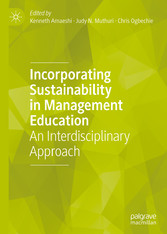Suchen und Finden
Service

Incorporating Sustainability in Management Education - An Interdisciplinary Approach
Kenneth Amaeshi, Judy N. Muthuri, Chris Ogbechie
Verlag Palgrave Macmillan, 2019
ISBN 9783319981253 , 251 Seiten
Format PDF, OL
Kopierschutz Wasserzeichen
Mehr zum Inhalt

Incorporating Sustainability in Management Education - An Interdisciplinary Approach
Contents
5
Notes on Contributors
7
List of Figures
13
List of Tables
14
1: Introduction
15
Reference
21
2: Embedding Sustainability in the Entrepreneurship Curriculum
22
Introduction
22
Sustainability in Entrepreneurship Education
23
A New Look at an Old Friend: The Business Plan
25
Case Study: Sustainability and Entrepreneurship at Slippery Rock University
31
Slippery Rock University
31
School of Business
33
Principles for Responsible Management Education (PRME)
34
Sustainable Enterprise Accelerator: CEDBA to SEA
34
Curriculum Design and Development
36
Sustainability, Entrepreneurship, and Innovation
36
Sustainable Business Consulting
38
Successes and Failures
39
Conclusion
40
Sustainability in Entrepreneurship
41
Proposed Module
41
References
42
3: Sustainability Accounting and Education: Conflicts and Possibilities
45
Introduction
45
What Is Accounting and Its Limits?
46
What Are We Actually Talking About?
49
Sustainability Accounting?
52
Extant Accounting
53
Extending Accounting Possibilities
53
Addressing Sustainability Directly
55
Education
57
References
61
4: Sustainability in Business Economics
67
Introduction
67
Sustainability in Business Economics
69
Teaching Sustainability in Business Economics
70
A Conceptual Framework for Teaching Sustainability in Business Economics
73
Focusing Teaching on Business Compliance
75
Infusing Sustainability into Economics
82
Sustainability Teaching in Macroeconomics
87
Final Reflections
88
References
89
5: Thinking Globally, Teaching Sustainability: Embedding Sustainability in International Business Studies and Addressing Student Responses
94
Introduction
94
Shifting IB from the Mainstream to a Sustainability Perspective
97
Pillar 1: Defining the MNC
98
Pillar 2: Internationalization
99
Student Responses to a Sustainability Perspective (and What to Do About Them)
102
Radicals
102
The Traditionalists
104
The Deer in the Headlights
106
The Highbrows
107
Conclusion
109
References
111
6: Sustainability in Marketing
116
Introduction
116
Background
118
Marketing Education for Sustainability
120
Planning for and Designing Sustainability Education in Marketing
121
Pedagogy and Teaching Methods
123
Setting the Context: Making the Case for Sustainability
123
A Brief Historical Review of Marketing’s Relation to Sustainability
125
Defining Sustainable Marketing
129
Embedding Sustainability Throughout the Marketing Curriculum
131
Pedagogical Challenges and Assessment
133
Final Thoughts
134
References
136
7: Sustainable Finance in Education
143
Introduction
143
Sustainable Finance: A Long and Winding Road
144
A Brief History of Sustainable Investment
146
Sustainable Finance: Nature Scope and Demand
150
The Emergence of the Sustainable Finance Professional: Niche to Mainstream
153
The Changing Skill Sets Required for Sustainable Finance Professionals
155
Is Traditional Financial Training and Curricula Fit for Purpose?
156
Academic Opinion on Sustainability Teaching
160
Should Responsible and Sustainable Finance Replace the Way Finance Is Currently Taught?
161
Summary
163
Appendix
164
The PRI Academy
164
Sustainability Accounting Standards Board (SASB)
169
FSA Credential Level I Syllabus
169
FSA Credential Level II Syllabus
172
References
174
8: Sustainability in Supply and Value Chain Management
176
Introduction
176
Background
179
Supply and Value Chain Management and Sustainability in Retrospect
181
The Case for Integration: Supply and Value Chain Management Education and Sustainability
185
Grounding Supply and Value Chain Management Curriculum in Sustainability
187
Sustainable Supply and Value Chain Management Concept
188
Curriculum Development for Sustainable Supply and Value Chain Management
189
Pedagogy and Delivery Methods
193
Reframing Supply and Value Chain Management in Sustainability
195
Concluding Commentary
195
References
198
9: Sustainability, Management Education, and Professions: A Practitioner Perspective
203
Introduction
203
Curriculum: Ensure Sustainability Is Central
206
Curriculum: The Centrality of Sustainability to Business
207
Context: Clearly Show the Value of Sustainable Business
208
Context: Champion Best Practice
209
Communication: Demonstrate Integrity Through Sustainable Practice
211
Communication: Cover the Complexity
212
Collaboration: Break Down Barriers Between Disciplines
213
Collaboration: Create Community
214
Connection: Cultivate Passion in the Cohort
215
Challenge: Explore Alternatives to the Consensus
216
Challenge: Cultivate Transformational Individuals
218
References
219
10: Three Faculty, Two Business Schools, One Goal
223
Introduction to Cranfield and the RBS
224
Cranfield University
224
Rotterdam Business School
225
The Seven-Step Model
226
The Model
226
Testing in the Classroom Phase
227
Cranfield
227
RBS
228
Feedback from Students and Businesses
228
The Jigsaw Target and SOMAT
229
Developing the Jigsaw Target
229
Developing Stages of Maturity (SOMAT)
231
Cranfield’s Stages of Maturity
233
Using the Models in Teaching
234
Experience at Cranfield
234
Experience at the Rotterdam Business School
234
Managing Corporate Sustainability (MCS)
235
Part 1
235
Part 2
236
Part 3
237
Assessment via Assignments
238
Final Course Workshop
238
Feedback from Students and Businesses on SOMAT and TARGET
239
Enterprises Studied
239
Student Evaluations
240
Business
240
Company Feedback
240
Further Potential Developments
242
Refining the Models
243
Refining the Teaching
244
Developing the Consulting Possibility
245
Conclusion
245
References
245
Index
247

